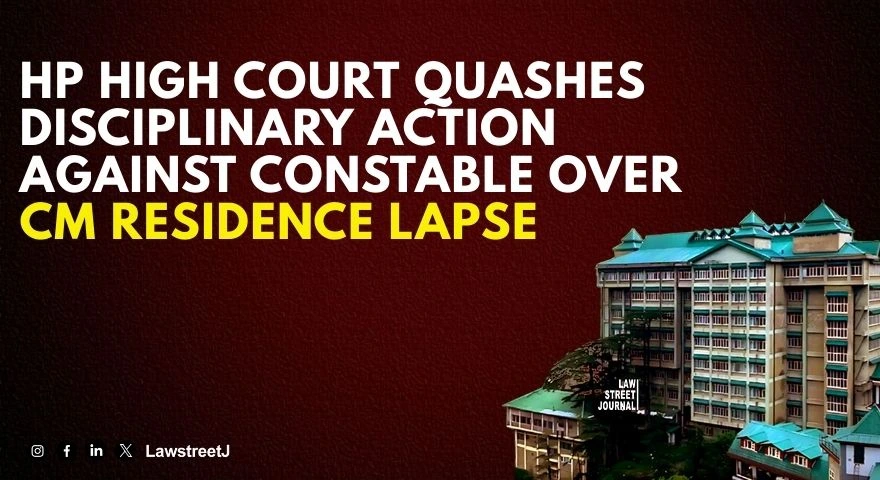Himachal: The Himachal Pradesh High Court has set aside the disciplinary punishment imposed on a police constable for an alleged security lapse at the Chief Minister’s residence, holding that no punishment can be imposed without clear evidence of misconduct.
The court of Justice Satyen Vaidya was addressing CWPOA No. 749 of 2019 filed by Hoshiar Singh, a constable in the 3rd Battalion, H.P. Armed Police, challenging disciplinary orders dating back to 2002 that resulted in forfeiture of four years’ service for future increment purposes.
The case originated from an incident on February 18, 2002, when the petitioner was on guard duty at Post No. 5 in the Chief Minister’s residential complex in Shimla. Around 4:00 PM, an unidentified person allegedly intruded into the high-security zone, sneaking through barbed wire and disappearing within moments after leaving behind a bag.
Following the security breach, disciplinary proceedings were initiated against the petitioner along with Sub Inspector Bhim Singh, Constable Shesh Ram No. 689, and Constable Ram Pal No. 886. The petitioner faced four charges, including failure to notice the intruder’s entry, failure to apprehend the culprit, allowing illegal criminal trespass, and failure to react appropriately.
The disciplinary inquiry officer, D.W. Negi, Deputy Superintendent of Police, found charges No. 1 and 4 proved against the petitioner in his inquiry report dated August 1, 2002. The disciplinary authority concurred with these findings, holding the petitioner guilty of “negligence amounting to grave dereliction of duty and professional incompetence.”
Initially, the authority proposed forfeiture of ten years’ service for future increments, but after considering the petitioner’s response to the show cause notice, reduced the punishment to four years’ permanent service forfeiture through an order dated October 27, 2002. The petitioner’s subsequent service appeal was dismissed on September 2, 2003, and his revision petition was also rejected on June 10, 2004.
Justice Vaidya found fundamental flaws in the disciplinary proceedings after examining the original inquiry records. The court noted: “It has neither been mentioned how the petitioner was responsible in the entire episode nor concluded what specific acts of omission or commission were attributable to him.”
After reviewing statements from 15 prosecution witnesses, the court found no incriminating evidence against the petitioner. Justice Vaidya observed: “None of the witnesses had stated that the alleged trespasser was within the sight or jurisdiction of the petitioner, or that despite sighting the trespasser, he failed to act.”
The court also noted that the petitioner’s defense established that “he did not come to know about the incident as the alleged trespasser had neither entered the complex from any area within his vicinity nor had his exit come to the petitioner’s notice.”
Additionally, the court criticized the disciplinary authority’s reasoning process, stating: “In the show cause notice dated 14.08.2002, the disciplinary authority purportedly arrived at its conclusion on the basis of records, relevant material of the departmental inquiry and the findings of the inquiry officer. However, in the said order, no reasoning or discussion is provided to support such a conclusion.”
The court held that the disciplinary authority had improperly relied on a preliminary inquiry report that “had faded away and lost relevance after holding of regular Disciplinary Enquiry.” The only substantiated fact was that the petitioner was engaged in conversation with someone outside the premises when called by a sentry at Post No. 4.
Justice Vaidya emphasized constitutional principles, noting that the conduct of the inquiry officer and disciplinary authority “clearly lacked fairness, which by itself is antithetical to the principles enshrined in Articles 14 and 16 of the Constitution of India.”
The court further observed: “The petitioner could be visited with civil and evil consequences of punishment only on proof of misconduct or dereliction of duty on his part. Since the punishment has been imposed without proof of any incriminating circumstance against the petitioner, such a perverse action cannot be sustained.”
Justice Vaidya concluded that the findings recorded in the disciplinary orders were “clearly perverse as they are not borne from the evidence recorded by the inquiry officer or any other material on record. Findings which are not based on evidence or otherwise not borne from the record are no findings in the eyes of law.”
Accordingly, the court ordered complete restoration of the petitioner’s service benefits that had been affected by the disciplinary action, spanning over two decades.
Mr. Sanjeev Bhushan, Senior Advocate, assisted by Mr. Sohail Khan, Advocate, represented the petitioner, while Mr. Gautam Sood, Deputy Advocate General, appeared for the respondents.
Case Title: Hoshiar Singh vs. The State of H.P. & Others
Disclaimer: This content is produced and published by LawStreet Journal Media for informational purposes only and does not constitute legal advice. The views expressed are independent of any legal practice of the individuals involved.







![Himachal HC Grants Bail to Man Accused of Unnatural Acts with Cow [READ ORDER]](/secure/uploads/2020/11/lj_8855_Himachal_Pradesh_High_Court.jpeg)
![Remaining in India after expiry of visa is offence, Himachal Pradesh HC reiterates while denying bail [Read Petition]](/secure/uploads/2023/12/lj_3841_e40384f4-2611-4a51-b179-97824c5e53c7.jpg)

![Supreme Court Stays Himachal Pradesh HC Order, Sanjay Kundu to Remain as State DGP Amid Businessman's Complaint [Read Order]](/secure/uploads/2024/01/lj_5499_5a926c6d-aa3b-4344-b54d-2c7fc5145ace.jpg)




